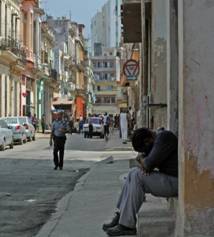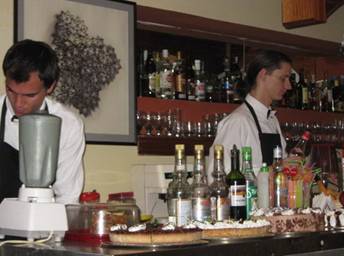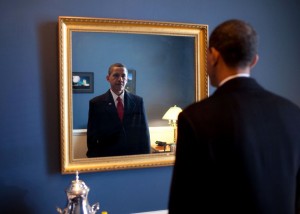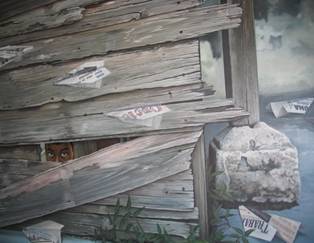



Translated by: Norman Valenzuela and Carlos Maristany
5 November 2012
English Translations of Cubans Writing From the Island




Translated by: Norman Valenzuela and Carlos Maristany
5 November 2012

Once again, a large swath of Nuevo Vedada saw its electricity cut off for almost eleven hours yesterday in order to replace worn-out electrical poles. I believe that in the end they replaced four. A great achievement really. As a result, the hard currency stores in our neighborhood—the majority—remained closed for the duration of the thinly-veiled blackout. If you needed to buy something, you had to travel far from home to find it.
There was electricity today, but La Mariposa was closed again, this time for more than two hours, because it was fumigation day. It was disconcerting to see all the employees of this establishment sitting in the park, patiently waiting for the smoke from the burnt petroleum they use as a fumigant to clear so that the store could re-open. This can take up to two hours.
I kept on walking in search of one of the two small hotels in the neighborhood. These were built to house patients from ALBA* countries, as well as their families, during their post-operative recoveries. Since this exchange has been suspended, they now serve as modest hotels whose guests are usually athletes. On the premises they have small but quite well-stocked stores.
I arrived at the Hotel Tulipán’s store at almost a quarter to ten, when it is scheduled to open. To pass the time, I decided to go to the cafe to have a coffee. The person at the counter apologized and told me that there were only two ceramic cups, which were being used at one of the tables, so he would have to serve it to me in a paper cup, if I was willing. I said that would be fine, but asked him why they had only two cups, considering this was a relatively new hotel. The problem, he told me, was that a request had been sent in, but the company had not yet responded. That’s the difference with private hotels, I told him, since the owner would have gone to buy more cups before they had run out.
I finally returned to the store. It was now a quarter after ten and they still were not open, even though through the glass doors I could see the employees standing around. There were now five of us waiting outside. The assistant manager arrived and an employee then opened the door to greet us, without looking at us or saying anything. A young man, who was also waiting and appeared to be in a hurry, asked her why they were still not open, and she, without even looking at him, said that the calculator was broken.
I continued on my journey and saw a kiosk which sold items for hard currency. I wanted to buy a big carton of juice to take to a sick friend. When I went to pay with a twenty, the employee calmly told me that I would have to come back later because he did not have enough change.
I returned home confused and frustrated at not being able to get anything I needed, thinking that it does not take a hurricane or an embargo to destroy this country. Sloth is taking care of that fast enough.
Translator’s note: A trade alliance of socialist or socialist-leaning Latin American countries, including Cuba and Venezuela.
November 7 2012
The photographer Claudio Fuentes Madan and Estado de Sats activist, Antonio G. Rodiles, since their violent and arbitrary arrests days ago, are on a HUNGER AND THIRST in protest and resistance against the political police and the murderers of our citizens.
Both continue to be INCOMMUNICADO or MISSING in the Castro prisons of the municipality of 10 de Octubre, in Lawton (at Acosta and Aguilera streets), because no one believes the words of their captors.
The are both very weakened and affected by low temperatures and poor prison conditions. Rodiles is suffering facial injuries from the beating given to him by the repressor called Camilo and others, including knocking him to the floor and punching and kicking him.
The novelist Angel Santiesteban-Prats has broken ribs and a cracked skull from the beating that was captured on a video shot by @ HablemosPress.
There are reports that in Santiago de las Vegas, prisoners are also on a hunger and thirst strike.
November 10 2012
The Cuban photographer Claudio Fuentes Madan from the independent photo agency CUBARAW, is still a prisoner, being tortured without charges or any type of contact with his friends and family, on these supercold nights at the Police Station in Aguilera Street in the Lawton neighborhood.
The police, with their criminal irony, say they didn’t arrest him, he’s not their prisoner, he’s just in arbitrary holding as long as the political police order it.
The state of his health is unknown and it’s very possible he’s on a hunger and thirst strike for three days now.
The repressor called CAMILO is especially brutal towards him, although in the video of the arrests its obvious that Claudio maintained a disciplined attitude toward the repressive authority of State Security the whole time.
DISTRIBUTE THIS URGENTLY, PLEASE…
November 10 2012
The Institute of Basic Sciences and Preclinics of Havana, renewed all its teaching activities last Monday, October 15, after several weeks.
According to information not published in the official media, the student body and professors of this institution focused on higher education are back in the classroom, after several weeks of being relocated to carry out inspections.
The renewal of educational activities coincides, mysteriously, with the 50th anniversary of this institution that carries the name of Victoria de Giron (Bay of Pigs Victory), a date which brought the leaders of the higher education for the Cuban Ministry of Health to this school in the capital.
The reincorporation of the students and educational activities was only from 8:00 in the morning to midday. At the end of this time they pursued the work of inspection in the zones affected by the Aedes Aegypti mosquito which carried dengue fever.
October 22 2012

In Cuba, unlike other countries where a minister is able and authorized to expose governmental policy, this is only the responsibility of the president. Due to that, if one wants really to know its contents and projections, one must go to him, through his speeches and public appearances. Some time ago, in an interview with the foreign press, the Minister of Foreign Affairs proposed that in order to invest in Cuba, one had to come with three or five hundred million dollars and, as the Cuban exiles did not have that, they were dismissed. It seems this character is not well versed in economics and his statement is quite messed up. If he was only trying to make a joke, it fell flat. The misguided approach, so absurd, does not deserve to be analyzed, but can serve as a starting point for some reasoning.
Currently Cuba, undercapitalized, in order to be able to undertake the road to solve its economic problems, should try to attract capital from outside — among the Cubans within, it does not exist — from both Cubans and from citizens of other nationalities, prioritizing the first, because of a basic sense of belonging.
This capital doesn’t have to be small-time nor that exaggerated, as the minister said. To invest in Cuba today is not easy and also constitutes a risk to anyone, because the laws and transparent regulations which would provide minimum and reliable assurances to investors don’t exist. As a result, as long as these are not enacted, investments — if any — will be on a small scale, but given no investment of any kind, even this could represent an injection of resuscitation to an economy in a prolonged coma.
Nor is it possible to aspire to the big enterprise — State of private — but rather to the development of small and medium enterprises, which have shown internationally to be the main generators of jobs and wealth, and which are also more prepared to succeed in times of crisis, because given their size they are more adaptable to changes, react faster and are more efficient in the introduction of the achievements of science, and in their systems of production and service. We are not reinventing the wheel, simply suggesting easily verified realities.
If Cuba doesn’t want to become a rentier state — dependent on foreign exploitation of some agricultural product, nickel, or the hypothetical oil in the gulf waters — it needs to take this path, which is consistent with real possibilities. Everything else is still a dream like soap bubbles, and to try to continue to live on external grants, is more of a political than an economic strategy.
Our country possesses fertile lands that are unproductive — the majority covered with the marabou weed — and other natural riches, as well as a skilled workforce, badly paid, which given the incentive of fair salaries and the possibility to develop their creative initiative, without absurd regulations that strengthen poverty, could produce the much-needed economic liftoff.
To intelligently combine State and private property on an equal competitive conditions, without economic missteps by political and ideological interests, would advance our country. To this end, the State must finally shed its false paternalistic attitude, that is just covering up its totalitarian nature, and exercise its role as regulator of social forces and nothing else, leaving aside impositions and command and control, which have both done so much damage. Only a democratic Cuba will be able to overcome the current crisis and insert itself into the overall world economy, as in the days when it occupied the place of the 29th most developed country in the world.
November 8 2012
Because the right to health doesn’t stop at the cell doors in Cuba. From November 1st to December 10th, 2012, to mark the World Day Against AIDS. We denounce the lack of rights, the poor food and the terrible sanitary conditions in the prisons for people with HIV/AIDS. The number of patients with HIV/AIDS within the six Cuban prisons for infected persons exceeds 600.
October 29 2012
 The exposition of Rocío García: the return of Jack the Punisher, exhibited from August until the first week of September in the Galería Habana, of Vedado, fascinates and surprises because of the composite work of the canvases, the insinuating beauty of every frame, and the recreating an old horror story through images that fantasize and refresh, from a feminine gaze, that series of deaths that implicated the English police in America at the end of the 20th century.
The exposition of Rocío García: the return of Jack the Punisher, exhibited from August until the first week of September in the Galería Habana, of Vedado, fascinates and surprises because of the composite work of the canvases, the insinuating beauty of every frame, and the recreating an old horror story through images that fantasize and refresh, from a feminine gaze, that series of deaths that implicated the English police in America at the end of the 20th century.
In this free version pictorial saga, the artist revives, draws, cheats and subjects to the spectrum of Jack Kimberland — the hypothetical Jack the Ripper — that Irishman who in 1888 stayed in a London hotel before being deported on suspicion of murder, after which he settled in a suburb of New York, where he was followed by the London police to confirm that the bodies of mutilated prostitutes corresponded to the profile of the Irish fugitive, who emerged as a great serial murderer.
As noted by Corina Matamoros in the catalog, “Jack the Punisher’s back. A red forest, with pure white rabbits crouched, saw him arrive armed, fierce, beautifully androgynous. His outlined body … will infiltrate the bar as usual, concealed among drinkers. In his lap he holds, with maiden sweetness, the rabbit of love, while looking thoughtfully at the mirage of a naked lady, sprawled on a sidewalk, sipping his Caipiroshka.”
The Jack of the 14 paintings by Rocío García is exceeded before being surprised, victim of such tempting beauties and the mirages of black magic and white magic. He punishes and is punished without thinking in Niki Cheng, a character invented by the brush to free the rabbit, who finally breaks his bonds and goes in a boat down the river, a metaphor for love and the interchanges between history, swords, pistols, sensuality and fierceness. All mixed by the mastery of the artist, friend of film mirages served in brilliant and unique colors.
Rocío García de la Nuez (Santa Clara, 1955), graduated from the Academy of Arts in San Alejandro, in The Habana (1977) and achieved the title of Master of Beautiful Arts in the Academy of Répin, San Petersberg (1983). Currently he is a professor of painting in the Academy of San Alejandro. He has shown his creative works in many personal and collective expositions within and outside of Cuba.
Among his personal offerings are The Tamer and Other Stories (Habana Gallery, JM 2003. Arts, Paris, 2005); Haikus (Sancti Spiritus Gallery, 2004); La Dama de la patica caliente (Havana Galerie, Zurich); and The Thriller , Museum of Fine Arts in Havana, both in 2007; Very, Very Light (Light Galleries and Suarez del Villar, Madrid, and La Casona, Havana, 2010), and Hidden Things (Sidney Mishkin Gallery Baruch College, New York, 2011).
His works have been in the Havana Auction and dozens of group shows at the Havana Biennial and other international events, among them the Caribbean:Crossroads of the World, Queens Museum of Art, New York, 2012; Cuban Pictures (Wilfredo Lam Center ); Contemporary Cuban Art in Beijing; and Madrid Art Fair in 2010; Dear Van Gogh and Abstract Art Project (Havana, 2009); We Ar Porno, Yes. First Annual of Porno Art (Space Aglutinador, Havana, 2008); Four Decades Before the Mirror (Paris, 2004); and Cuban Artists (Ricoleta Cultural Center, Buenos Aires, 2001).
September 12 2012
 It was not only Barack Obama’s supporters in Chicago’s Democratic party circles who celebrated the close victory over his Republican challenger, Mitt Romney,with champagne. Though without as much rejoicing, the club of Communist businessmen, who together control 80% of Cuba’s feeble national economy, probably also spent midnight on November 6 calmly celebrating the Obama victory with a toast.
It was not only Barack Obama’s supporters in Chicago’s Democratic party circles who celebrated the close victory over his Republican challenger, Mitt Romney,with champagne. Though without as much rejoicing, the club of Communist businessmen, who together control 80% of Cuba’s feeble national economy, probably also spent midnight on November 6 calmly celebrating the Obama victory with a toast.
In the last four years the measures approved by the Democratic administration have caused the cash registers in Cuba to ring out joyfully. Since January 2008, when the “Hawaiian hurricane” captured the attention of half the world with his restrained conversational style and promises of change, the issue of Cuba has never been among his political priorities.
Obama came to the U.S. presidency buffeted by a terrible crisis which shook the foundations of the world’s largest economy, two ongoing wars and a trail of international condemnation for the aggressive and unilateral policies of his cowboy predecessor, George Jr.
In his first term he rescued Detroit’s automotive industry which, alongside Coca Cola, Apple and McDonald’s, is a symbol of American greatness. Against all odds he got Congress to approve “Obamacare” and brought American troops stationed in Iraq home. Obama is perhaps the best president the United States could have had in these times.
According to a poll by the Elcano Institute 70% of Europeans approve of his administration. In Africa, Asia and Latin America the numbers are similar. Only in Israel is Romney favored over Obama. His list of unfulfilled promises is short. Within the first two years of his presidency a Republican-majority Congress became a formidable opponent, blocking all his legislative initiatives.
Because of China’s economic expansion, the Arab Spring, the Iranian nuclear threat and the euro zone crisis, the diplomatic squabble with Washington, which the regime in Havana often stages as a publicity stunt, is not high on the Obama agenda.
In terms of Cuba the first black president has fulfilled his election promises. He re-instituted family-related trips to the island as well as cultural and academic exchanges, and increased the amount of money that could be sent to Cuba to $10,000. But the Castro brothers wanted more. They wanted Obama to rescind the economic embargo and grant political pardons to five Cuban spies imprisoned in the United States.
The White House’s spokesmen were emphatic. The ball was in Cuba’s court. It was Raúl Castro’s turn at bat. Pressured by the death of the dissident Orlando Zapata after an 82-day hunger strike, the government negotiated the release and exile of almost a hundred political prisoners.
Castro II was also committed to a pallid economic reform plan and to getting rid of absurd restrictions that prohibited Cubans from having mobile phones, buying and selling cars, and renting hotel rooms. And although officials in the White House saw the reforms in Cuba as a step forward, the bar was not raised with new liberalizing initiatives. They demanded democracy, respect for human rights and the political opposition, and that the general remove the padlock from the internet.
The official press, the voice of party that had controlled the destiny of Cuba for 53 years, called off the brief honeymoon with Obama. Fidel Castro cast the first stone with a barrage of attacks on the American leader and on “Yankee imperialism.”
But behind the curtains, where real politics take place, the mandarins can feel satisfied. In the last four years, thanks to family reunification measures adopted by Obama, remittances have doubled from one billion dollars to a little more than two billion in 2011. The value of commercial goods brought in by agencies and “mules” hovers at around three billion. After Canadians, Cuban-Americans make up the second largest group of visitors to the island.
The autumn of 2012 was critical for General Castro. If Hugo Chávez and Barack Obama had lost their elections, regime officials in the Palace of the Revolution would have been forced to dust off emergency contingency plans, which would have quickly led to changes more serious and profound than the current ones.
The victories by Chavez and Obama are a dose of oxygen for the Cuban autocrats. The purchase of one hundred million barrels a day of Venezuelan petroleum at wholesale prices, combined with the deep pockets of the Bolivian comandante and the continuation of Obama’s policy of family re-unification, will allow fresh funds to flow into government coffers, and the Castros will be able to sleep soundly.
It is not that inside Cuba everything is rosy. Far from it. But Obama’s re-election has given Castro II significant room to maneuver.
More importantly, it buys time, especially if we remember that Fidel is 86 and Raúl is 81. At their ages, having four more years to steer the ship through calm waters in a country that survives on charitable donations and remittances from overseas is good news. It warrants opening a bottle of champagne.
Photo by Pete Souza, official White House photographer. Born in the United States in 1954, Sousa is of Portuguese background.
November 8 2012
 Since yesterday, November 7, 2012, there have been numerous arbitrary arrests, which continue to today. The number arrested at this time is impossible to determine because, as on previous occasions, the mobile and fixed phones of those involved have been interrupted and cut off. Among the arrested are Antonio Rodiles and Yoani Sanchez.
Since yesterday, November 7, 2012, there have been numerous arbitrary arrests, which continue to today. The number arrested at this time is impossible to determine because, as on previous occasions, the mobile and fixed phones of those involved have been interrupted and cut off. Among the arrested are Antonio Rodiles and Yoani Sanchez.
The trigger for the current situation was the arrest at her home of the independent attorney Yaremis Flores, from the legal association CubaLex. As a result a group of people gathered to demand her immediately release in front of the State Security station known as Section 21, at 31st and 110th Avenues in the Playa neighborhood of Havana. Her husband, Veizant Boloy, also a lawyer, was the first arrested when he went to inquire about the whereabouts of Yaremis. All of her friends who demanded an explanation were violently arrested.
Today, the same thing happened in from of the Aguilera station where Antonio Rodiles and Laritza Diversent, a CubaLex attorney, have been held for more than 24 hours. People waiting peacefully there for someone to respond with words were met with a hard beating and put behind bars. Some of those arrested between yesterday and today are: Andrés Pérez, Mario Morago, Vladimir Torres, Rolando Rabanal, Luis M. Fumero, Ailer Gonzalez (released today at three in the afternoon), Antonio Rodiles, Eugenio Leal, Agustine Lopez, and Angel Santiesteban, who is now at home with two fractured ribs, a cracked skull and on hunger strike.
Orlando Luis Pardo Lazo and Claudio Fuentes Madan are, as of now, missing.
In addition to those arrested in the capital, we can add Jose Daniel Ferrer of the Cuban Patriotic Union — UNPACU — arrested in Santiago de Cuba, and Enyor Diaz Allen of Hablemos Press in Guantanamo.
In article 58 of the current Constitution of the republic of Cuba it says: The freedom and inviolability of their person is guaranteed to all who reside in the national territory. No one can be arrested except in the cases, in the manner and with the guarantees prescribed by law…
The reasons for these arrests have not been communicated, not to the families of those arrested, no, of course, in the national news media.
But the reasons are numerous. One day after Barack Obama’s reelection as president of the United States, the agents of the Cuban dictatorship may feel tempted to ratify to the Cuba people the absolute contempt they have for our universal and inalienable rights. The international community is notified in this way of the absolute impunity with which we continue to be treated, from this infinite archipelago, we are deciding to plant, in our fertile ground, the great tree of freedom.
The critical situation presented in the east of the country does not escape us, where the passage of Hurricane Sandy has aggravated the situation of food and public health, with various regions reporting the appearance of cases of cholera, which the Cuban government conceals, in addition to the extensive dengue fever epidemic that we have suffered for several months, the statistics of which are also “a strict State secret.”
The death of Fidel or Raul Castro would be another reason to strip from Cuban civil society it’s most vocal representatives. A cowardly government panics if it is left leaderless.
The group of those arrested has been participating for months in the civic campaign For Another Cuba, which urges the government of Raul Castro to ratify the United Nations’ International Covenant on Civil and Political Rights and the Covenant on Economic Social and Cultural Rights, signed by the Cuban Government on 28 February 2008 in the city of New York, the only truly hopeful step, for the obligations that such ratification would imply for this sad government. The consequences of such ratification would be the final replacement of the governing apparatus of Fidel Castro.
We demand, immediately, the release without charges of the several people arrested, and the termination of arbitrary arrests that hinder the development of the civic activities organized by civil society.
We ask the Cuban people to evaluate the complicity that is derived from intimidating actions, and not to accept the deception that involves the extension of a regime that requires permissions, when we are so close to a regime of freedoms, and to the international community what maintains support for our civil society, because Cuban still deserves, like the rest of nations, full freedom and sovereign self-government.
Boris Gonzalez Arenas
Lia Villares
Ailer Gonzalez Mena
November 8 2012


National baseball season in Cuba is about to begin. Once again, the bleachers of the entire nation will hear the free screams of those who bet for their local picks, and the island will have news of the fervor of its sons. The best known workers of the interior towns will organize trips to the capitals of the provinces, renting trucks to see the games. It doesn’t matter that they return during late night hours. For them, the valor of that sacrifice lies in seeing the local prospects, wearing the shirts of their local teams and screaming at the top of their lungs in favor of their favorite team, the allowed insults, the obscenities of a spirit contained in rage and frustration. Many times I have asked myself when will be the day when those shouts and expressions take on the cause of civil disobedience, of the unconformity of those inside, with the ovens turned off, scorched hopes and broken dreams. When one screams at the top of their lungs for teams like the Industrials, Santiago or Matanzas, something begins to take part in the conscience for the scream of tomorrow.
One defender of the socialist Cuban essay occurred to say one day that the baseball “meeting” in the Central Park was one of the most important democratic debates in the country. Of course, he said it in the lampoon “El Caiman Barbudo” [’The Bearded Caiman], which served as the cultural organ of the Young Communist Union for a long time. Years later, the non-conformist Orlando Zapata Tamayo decided to make his own public debate in favor of Human Rights in the Central Park of Havana, which was an antecedent which cost him an abusive sentence, of more than 50 years, which led to his death during a hunger strike. The ‘democratic space’ of the baseball parks of Cuba are muzzled by laws as absurd as Disrespect of the Commander in Chief, Public Disorder and the ridiculous Pre-Criminal Social Dangerousness Law, all of which attack citizen unconformity, which will break free sooner or later.


The debate about possible ways to move through the Cuban economy in order to emerge from its prolonged crisis attracts the attention of different specialists both within and outside the country. This is good because it represents a qualitative change with respect to the times in which there prevailed a single opinion. That there exist different points of view, and, at least on the informal and semi-formal plane, serious arguments are debated, leaving aside political and ideological Manicheism, allows us to have some level of optimism.
There are those who consider it possible to update the model, achieving some more or less profound changes, but without altering its socialist essence, citing its achievements in health, education, social assistance, etc. They only differ in the higher or lower speed at which they should be executed. Others think that it is impossible to update the model and that it must be changed, citing its complete economic failure and its manifest incapacity to create wealth. Between these two positions are debated other intermediary ones, taking aspects of some and of others, plus some alien to both.
Finding the ways to go is no easy task: There is more than 50 years of experiments, misunderstandings, mutual aggressions, insults, offenses, extremism, dogmatism, imposition and lack of respectful dialogue between the parties in conflict, that weigh on current subjects.
To shed this negative weight is essential if we want to find the best ways or, at least, more practical ones at this historic moment. There is another reality that conspires against it, and this if the issue of the necessary political and social changes that enable, facilitate and consolidate the economic changes, which seem to be a taboo subject for the established authorities. Without them, everything that is done will lack permanence because they can rescind it at any time given a political situation, something that has happened before.
In order for the changes conceived within the intended update of the model to have lasting effect and to encourage the creation of wealth — the only source of citizen prosperity and of the maintenance and perfection of the health, education, social assistance, and other programs that are incorporated — it is essential to have a political and social structure different from the current one, capable of consolidating and developing these changes.
It is a secret to no one that the eminently totalitarian character currently in force, is not the best. Its inability to maintain achievements reached during the Republic, and to create other new ones, has been demonstrated by more than fifty years of ineffectiveness in the exercise of absolute power. This makes one think of more democratic ways, consistent with our national characteristics, to assure real citizen participation in the government of the Nation.
Although I do not reject outright the update plan as a primary solution, because what it represents for some minimal improvement for some population sectors, I prefer to change the model, because I do not think it is possible to update it: it has been erroneously built from its foundations and, finally, it will have to be demolished. It is just that, the more time it takes to happen, the privations and difficulties will be unnecessarily prolonged, to the disgrace of our citizens and the country.
October 29 2012